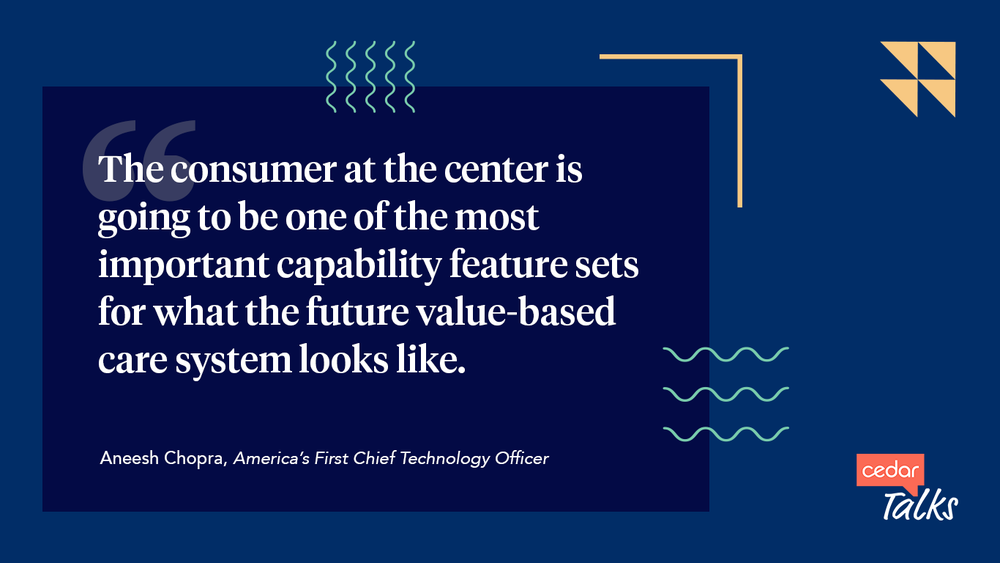Aneesh Chopra is the President of CareJourney, an open data membership service building a trusted, transparent rating system for physicians, networks, facilities and markets. He served as the first U.S. chief technology officer under President Obama and in 2014 authored Innovative State: How New Technologies can Transform Government.
During the hour-long Cedar Talk, Chopra shared his insights into creating infrastructure for innovation, advancing healthcare interoperability and creating a more tech-savvy government. To watch the full wide-ranging conversation, click here.
Using innovation to solve government problems
Chopra was surrounded by innovative minds from a young age: his father was a colleague of Sam Pitroda, “the father of India’s IT revolution.” Chopra was hugely inspired by Pitroda’s mission to bring phone lines to every village in India—and by how he achieved it.
“[Pitroda] said there’s an innovative path to solve problems,” Chopra said. “They invented a whole new architecture to bring […] connectivity and they wired up every single village […] so everybody had access to a phone. Chapter one in my life was the idea that technology can be an enabler to solve problems.”
As a student at Johns Hopkins University, Chopra became passionate about healthcare reform and had the opportunity to work with the university president. Then he saw the beginnings of the internet revolution.
“So you put those three pieces together: a passion for problem solving, understanding that healthcare was going to be our generation’s conundrum and that we can leverage the internet as a unifying platform for good,” he said. “That became the organizing theme for my life.”
Want to know how those “three pieces” fit together to inspire Chopra’s trajectory? Check out 3:11.
From the Virginia “minor leagues” to the White House “major leagues”
When asked about becoming the nation’s first CTO, Chopra explained how he played for the Virginia “minor leagues” as a state CTO. During his tenure, the scope of his work evolved from marketing to public-private partnership management in order to “bring some horizontal knowledge about what the internet can do […] the role of data and the role of standards.”
“So that is the job description that I took to President Obama,” Chopra recalled. “We said ‘let’s develop this CTO role as an enabler to solve problems that are important to President Obama and would move the country forward.’ We said to every federal agency, ‘you’re going to open up your data. You’re going to modernize your backend systems and move to the cloud. We’re going to create standards so that the industry can regulate.’ We can regulate the industry towards more market competition, and that can be true in banking. It can be true in education. And for sure it’s been true in healthcare.”
What was it like to be in the White House Roosevelt Room every morning with President Obama? Why was Chopra’s biggest accomplishment selecting his successor as CTO? And why were the biggest challenges of his role cultural rather than technological? To find out, click here and navigate to 13:37.
Why does healthcare lag far behind other industries in data standardization?
Chopra calls the lack of data interoperability in healthcare “a great case study in customer vendor dynamics.” He pointed out that in healthcare, unlike banking—where customers demanded open data to manage their finances with apps such as Mint—healthcare systems tried to restrict data to keep patients in their system and get their wallet share. “In fact, interoperability lowers revenue growth because [they] may have to compete,” he said. “But that is shifting, and now that the rules are final and that there’s more incentive to move to value-based care, we’re going to see that demand curve meet the technical capacity. And so we’re going to see a flurry of SMART on-FHIR applications that are patient-facing and physician-facing over the next five years.”
Find out why Chopra believes that rerouting patients is critical to reducing healthcare spending, why Medicare rates feel like “Goldilocks,” and why the U.S. needs to create a new healthcare model rather than replicate another country’s model by watching the full discussion here.
Cedar Talks is a thought leadership series highlighting experienced entrepreneurs, tech innovators and healthcare leaders who are solving important problems by challenging the status quo. Recent Cedar Talks have included Affirm founder and CEO Max Levchin, Clinton Foundation Vice Chair Chelsea Clinton, Peloton co-founder Graham Stanton and former President of Livongo Dr. Jennifer Schneider. Want to keep up with future Cedar Talks? Click here to join the mailing list.



